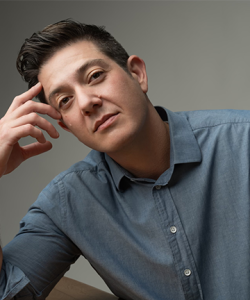Lunch Poems With Sherwin Bitsui
In this recent installment of UC Berkeley’s Lunch Poems series, Sherwin Bitsui reads selected poems from his collections Flood Song (Copper Canyon Press, 2009) and Dissolve (Copper Canyon Press, 2018).
Jump to navigation Skip to content
In this recent installment of UC Berkeley’s Lunch Poems series, Sherwin Bitsui reads selected poems from his collections Flood Song (Copper Canyon Press, 2009) and Dissolve (Copper Canyon Press, 2018).
In this Poetry.LA interview, host Luivette Resto speaks with poet Amy Shimshon-Santo about her new collection, Random Experiments in Bioluminescence (FlowerSong Press, 2024), and the themes within the book which deal with how to live in a time of great suffering and disorientation, and “somehow have the experience of finding your own light.”
The practice of cutting one’s hair can sometimes be an emotional process—the shedding of one’s layers much like the way a snake sheds its skin. For some, cutting hair might symbolize a spiritual rebirth, embracing new beginnings and letting go of the past. For others, it can be a traumatic experience. Haircuts can be well thought-out decisions, premediated and anticipated, or spur of the moment, an abrupt change to one’s appearance. Write a poem about your last haircut or the experience of observing a haircut. Include details of where you were, who was cutting the hair, the sounds of the clippers or scissors, and the emotions you experienced. Read “Haircut” by Elizabeth Alexander and “Hair” by Orlando Ricardo Menes for further inspiration.
In this Books Are Magic event, Miller Oberman reads from his latest poetry collection, Impossible Things (Duke University Press, 2024), and is joined by poets Jason B. Crawford, Joan Kwon Glass, and I. S. Jones for a reading and Q&A. For more from Oberman, read his installation of our Ten Questions series.
“Your mind wants to move, and the best thing a work of art can do is take your mind with it, moving somewhere you never expected to move.” Anne Carson talks about the artists and philosophers who inspire her to create and think, and how boxing has helped her in the wake of her recent diagnosis of Parkinson’s disease in a conversation with Norwegian author Linn Ullmann for this Louisiana Channel event.
In early September, mysterious white blobs began washing ashore on the beaches of Newfoundland in Canada, described as sticky, spongy, and doughy. Beachcombers and scientists alike were confounded—were the blobs of animal or plant origins? Were they toxic or innocuous, or created from industrial waste? As scientists continue to collect samples and run tests on these mysterious blobs, take this period of uncertainty to write a poem about a blob: these beach blobs, a blob inspired by science fiction, an explicitly frightening or comedic blob, or perhaps an experience that simply feels blob-like. How does the slipperiness of this concept lend itself to metaphors in your poem? Consider experimenting with the shape of your text, creating a concrete, yet blobby, poem.
“When we die, our souls leave our bodies, / take with them everything they loved.... In Gaza, our bodies and rooms get crushed. / Nothing remains for the soul.” In this Busboys and Poets event, Mosab Abu Toha reads from his collection Forest of Noise (Knopf, 2024), and discusses his recent experiences in Gaza in a conversation with Isra Chaker. An interview with Abu Toha by Destiny O. Birdsong appears in the November/December issue of Poets & Writers Magazine.
In this video for the Poetry Society of America’s Storefront Poems series, Kimiko Hahn reads her poem “Ode to the Mud in Corona Park,” which appears in her collection The Ghost Forest: New and Selected Poems (Norton, 2024). For more from Hahn, read her installation of our Ten Questions series.
In Rae Armantrout’s poem “Unbidden,” which appears in her collection Versed (Wesleyan University Press, 2009), the poet’s use of short lines in conjunction with enjambment contribute to a sense of disjointedness. “The ghosts swarm. / They speak as one / person. Each / loves you. Each / has left something / undone,” writes Armantrout. This week compose a poem that revolves around a feeling of inconclusiveness. For your subject matter, consider a situation or relationship from your past that feels unfinished, one that continues to haunt you with questions. Deploy enjambment strategically—splitting up specific phrases and ending lines with significantly weighted words—to create a sense of discontinuity and unknowability.

“[T]herapeutic modes can enhance artistic work enormously, because they give us access to our inner workings in fresh, sometimes even revelatory ways. ” —Miller Oberman, author of Impossible Things